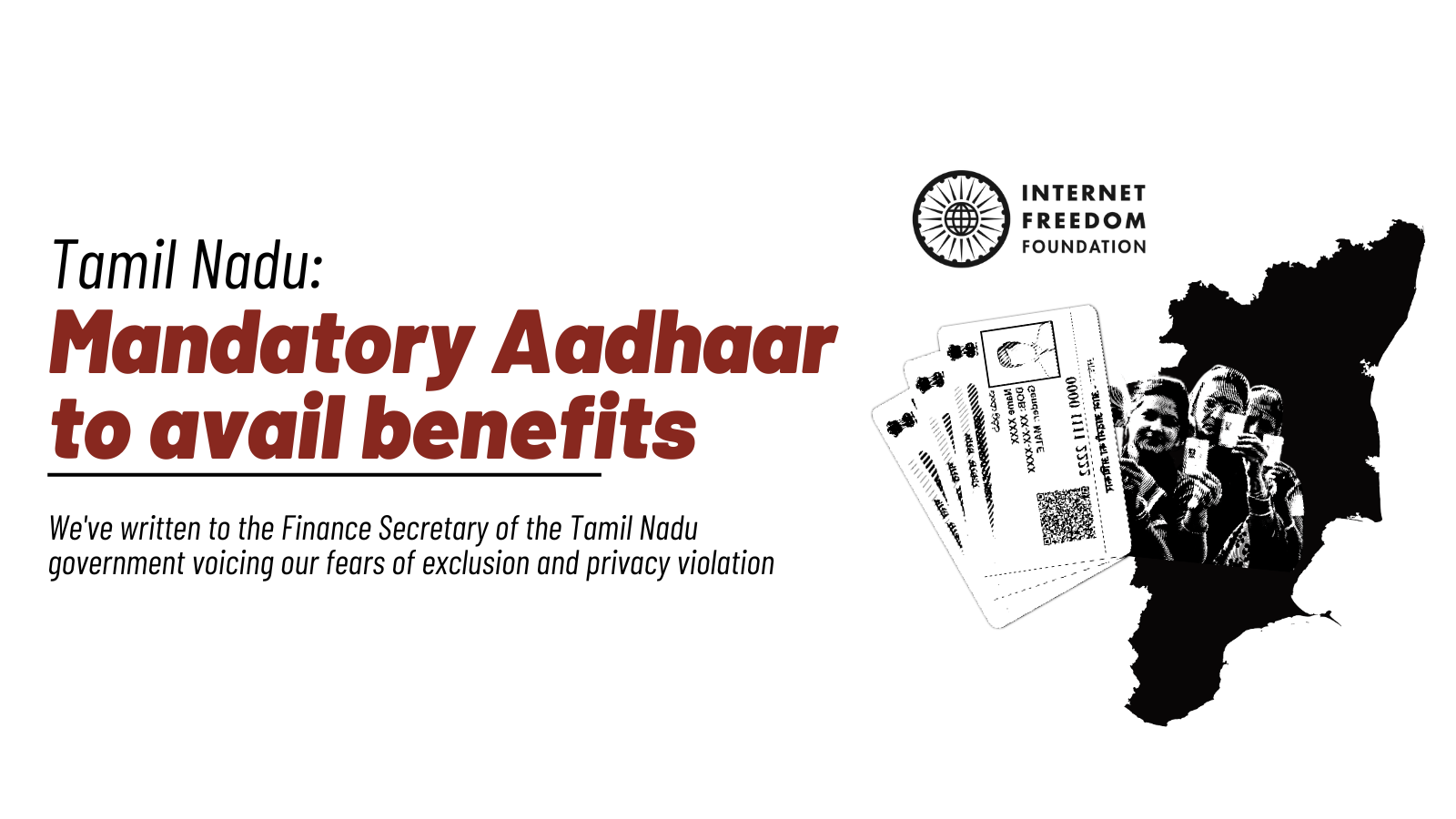We wrote to the Tamil Nadu government on mandatory submission of Aadhaar: Voicing our fears of exclusion and privacy violation

tl;dr
We have written to the Finance Secretary of the Tamil Nadu Government highlighting our concerns of exclusion and privacy around the notification mandating linkage of Aadhaar to avail benefits under all State government schemes. We have requested the Tamil Nadu government to cease the mandatory requirement for Aadhaar and consider accepting alternate and viable means of identification such as driving licence, passport, etc. to avail benefits under the government scheme, as it will not only prevent exclusion of beneficiaries who are otherwise rightfully entitled to these benefits but will also address the legitimate privacy concerns.
Background
A notification released by the Tamil Nadu government on December 14, 2022, requires all those who are eligible for benefits (other than minor children) under various government schemes to submit proof of possession of an Aadhaar number or undergo Aadhaar identification (and subsequently provide the Aadhaar Enrolment Identification slip). This comes in the backdrop of Tamil Nadu Generation and Distribution Corporation (Energy Department) issuing a government order, dated October 06, 2022 mandating consumers benefiting from various subsidy schemes to link their Aadhaar numbers with the electricity consumer numbers. The Madras High Court affirmed the legitimacy of the Energy Department's order on December 21, 2022, while rejecting a plea challenging it.
This order is disappointing in the light of an order of the Odisha HC, when it directed the Odisha Government in 2020 to roll back its plans to link Aadhaar to social pensions to ensure that ex-gratia payments under the pension scheme were not to be denied because of lack of Aadhaar. The High Court stated that the Commissioner, Cuttack Municipal Corporation, “shall examine the genuineness of those persons where disbursement is required to be made, in absence of any Aadhaar Card to verify genuineness of the claim”. The Madras High Court order makes Aadhaar linkage mandatory rather than voluntary, as should ideally be the case
Our concerns
The notification contends that the use of Aadhaar as an identity document for delivery of services, benefits or subsidies enables beneficiaries to get their entitlements directly in a convenient and seamless manner by “obviating the need to produce multiple documents to prove one’s identity”. However, the notification contradicts itself by asking for multiple documents when it mandatorily asks for an Aadhaar enrolment identification slip *as well as* any other means of identification in case a person does not possess an Aadhaar number. The alternative provided for not possessing an Aadhaar number is to make an application for Aadhaar enrolment before registering for the Scheme. After enrolling, the beneficiary is expected to provide the Aadhaar Enrolment Identification slip *and* any of the other modes of identification such as driving licence, passport, etc.
This process of identification goes against the 2019 Puttaswamy judgement which states that alternate and viable means of identification like Passport, Driving licence, etc. should suffice for identification purposes. However, the Tamil Nadu government has asked for these alternate means of identification in addition to the mandatory Aadhaar Enrolment Identification slip. This coerces an individual to share their Aadhaar information for authentication purposes, thus increasing the risk of violation of their right to privacy. This also contradicts the Supreme Court ruling in Justice (Retd.) K.S. Puttaswamy v. Union of India (2019) and Section 7 of the Aadhaar Act, 2016. This exercise may lead to denial of benefits to people who do not possess an Aadhaar number, even if they are rightfully entitled to the same. The risk posed by the Tamil Nadu government’s notification is not just limited to exclusion, but it also raises legitimate concerns of privacy violation.
The Supreme Court in the 2019 Puttaswamy judgement, highlighting the risk of exclusion based on technological inadequacies such as failure to identify fingerprints due to damage or ageing, emphasised that “no person rightfully entitled to the benefits shall be denied the same on such grounds. It would be appropriate if a suitable provision be made in the concerned regulations for establishing an identity by alternate means, in such situations”. The Aadhaar verification system is plagued by technological flaws, which have already resulted in exclusion from welfare benefits, as well as instances of fraud, leakage and biometric failure. Given these risks, the Supreme Court of India's ruling on the right to privacy in Justice K.S. Puttaswamy. (Retd.) v. Union of India (2017) would be violated if Aadhaar is made the only option to avail benefits under the government scheme. This unconstitutional exercise may expand the Aadhaar database, thus allowing the Government to profile beneficiaries consequently increasing the risk of state surveillance based on grounds of caste, sex or religion.
Our requests
In our letter to the Tamil Nadu government, we reiterated that no person shall be denied the benefits they are rightfully entitled to and be compelled to provide their Aadhaar information. We requested that the State government abide by the 2019 Puttaswamy ruling and refrain from compelling individuals to mandatorily provide their Aadhaar information. Instead, we urge the Tamil Nadu government to recognise alternative and viable forms of identification, such as voter id card, passports, driver's licence,etc. as valid forms of identification for accessing government benefits. We also requested the government to make the procedures identical for those with and without Aadhaar numbers, thereby leaving the choice up to the beneficiaries.This modification will ensure that beneficiaries are not denied the benefits they are rightfully entitled to.


